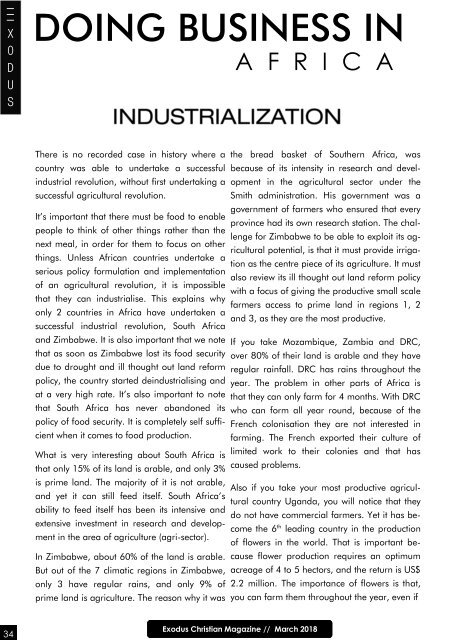ExodusMagMar2018
Create successful ePaper yourself
Turn your PDF publications into a flip-book with our unique Google optimized e-Paper software.
X<br />
O<br />
D<br />
U<br />
S<br />
DOING BUSINESS IN<br />
A F R I C A<br />
There is no recorded case in history where a<br />
country was able to undertake a successful<br />
industrial revolution, without first undertaking a<br />
successful agricultural revolution.<br />
It’s important that there must be food to enable<br />
people to think of other things rather than the<br />
next meal, in order for them to focus on other<br />
things. Unless African countries undertake a<br />
serious policy formulation and implementation<br />
of an agricultural revolution, it is impossible<br />
that they can industrialise. This explains why<br />
only 2 countries in Africa have undertaken a<br />
successful industrial revolution, South Africa<br />
and Zimbabwe. It is also important that we note<br />
that as soon as Zimbabwe lost its food security<br />
due to drought and ill thought out land reform<br />
policy, the country started deindustrialising and<br />
at a very high rate. It’s also important to note<br />
that South Africa has never abandoned its<br />
policy of food security. It is completely self sufficient<br />
when it comes to food production.<br />
What is very interesting about South Africa is<br />
that only 15% of its land is arable, and only 3%<br />
is prime land. The majority of it is not arable,<br />
and yet it can still feed itself. South Africa’s<br />
ability to feed itself has been its intensive and<br />
extensive investment in research and development<br />
in the area of agriculture (agri-sector).<br />
In Zimbabwe, about 60% of the land is arable.<br />
But out of the 7 climatic regions in Zimbabwe,<br />
only 3 have regular rains, and only 9% of<br />
prime land is agriculture. The reason why it was<br />
the bread basket of Southern Africa, was<br />
because of its intensity in research and development<br />
in the agricultural sector under the<br />
Smith administration. His government was a<br />
government of farmers who ensured that every<br />
province had its own research station. The challenge<br />
for Zimbabwe to be able to exploit its agricultural<br />
potential, is that it must provide irrigation<br />
as the centre piece of its agriculture. It must<br />
also review its ill thought out land reform policy<br />
with a focus of giving the productive small scale<br />
farmers access to prime land in regions 1, 2<br />
and 3, as they are the most productive.<br />
If you take Mozambique, Zambia and DRC,<br />
over 80% of their land is arable and they have<br />
regular rainfall. DRC has rains throughout the<br />
year. The problem in other parts of Africa is<br />
that they can only farm for 4 months. With DRC<br />
who can form all year round, because of the<br />
French colonisation they are not interested in<br />
farming. The French exported their culture of<br />
limited work to their colonies and that has<br />
caused problems.<br />
Also if you take your most productive agricultural<br />
country Uganda, you will notice that they<br />
do not have commercial farmers. Yet it has become<br />
the 6 th leading country in the production<br />
of flowers in the world. That is important because<br />
flower production requires an optimum<br />
acreage of 4 to 5 hectors, and the return is US$<br />
2.2 million. The importance of flowers is that,<br />
you can farm them throughout the year, even if<br />
34<br />
Exodus Christian Magazine // March 2018















